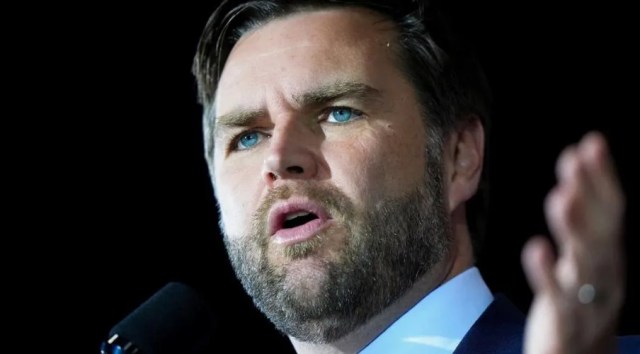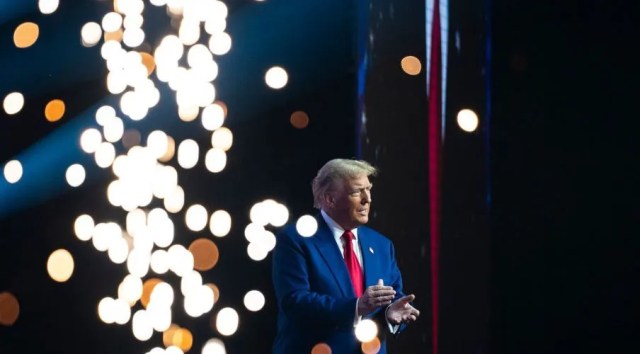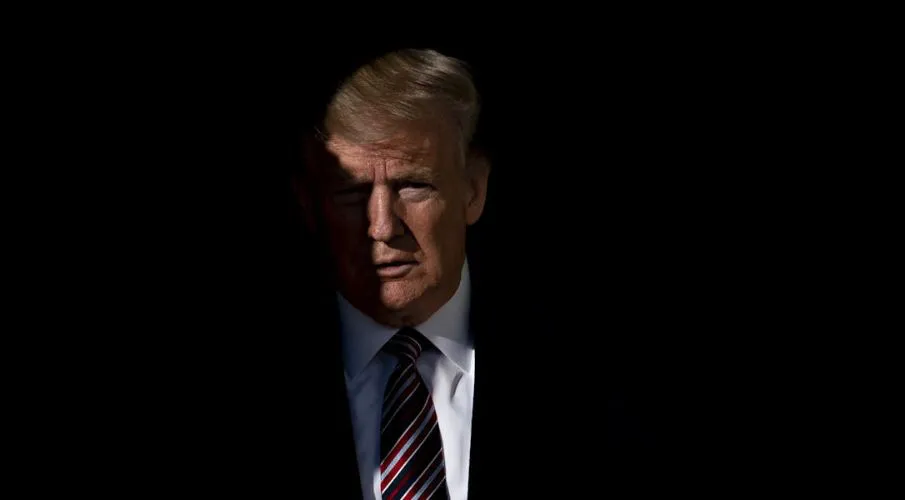Europe feels the cold breath of a political turning point – and it does not come from Moscow. It is the United States under Donald Trump that is shaking Europe’s internal balance with missionary zeal. The president has repeatedly described the European Union as an enemy, created to exploit America, worse than China as an economic rival. His vice president, JD Vance, goes deeper to the foundations: He describes European democracy as a rotten system that suppresses religious practice, promotes migration against the will of the voters, suspends elections and censors the radical right. In February Vance appeared in Munich with a frontal attack – and did not leave the stage without interfering in German domestic politics: He met the head of the AfD, classified as unconstitutional, in the middle of the election campaign. A taboo break that set a precedent.

Since then, senior government officials in Washington have been openly expressing their sympathy for national conservative parties almost everywhere in Europe: in Britain, the Czech Republic, France, Hungary, Italy, the Netherlands, Romania, Slovakia and Spain. The common program is called civilizational nationalism: national identity, strong leaders, Judeo-Christian values, traditional gender roles, anti-migration and anti-Islam policies. In the eyes of the new American conservatives this is the only effective countermedicine to liberalism, which they see as a security threat. Already these contacts are systematically networked through transnational platforms such as the "National Conservatism Conference," where US government representatives and European right-wing parties devise common strategies – a kind of counterpart to the international social democracy of past decades, only with the opposite ideological sign.

The murder of Charlie Kirk and the government’s handling of it have further fueled the ideological campaign. While Trump and his people declare the freedom of speech of the right to be a reason of state, at the same time they intensify the fight against what they brand as leftist hate speech – up to and including the satisfaction over the silencing of popular critics such as late-night host Jimmy Kimmel. The chairman of the Federal Communications Commission, Brendan Carr, hinted at using regulatory instruments against ABC and its affiliated stations. A signal to Europe’s right, many here say: This could happen here too – with backing from Washington.

That the messages are not coincidental was shown in May in Warsaw. Kristi Noem, secretary of homeland security and hard culture warrior, warned conservatives there against "leaders who govern out of fear" and who perverted freedom with politics of fear. She openly supported Karol Nawrocki, candidate of a Polish far-right party that wants to reshape the EU. Trump received Nawrocki at the White House during the election campaign – and once again after his victory. It is this chain of gestures that puts the word "regime change" on the lips in European capitals. One sees American officials who not only crash into election campaigns, but also undermine EU regulation, meddle in Greenland – territory of a NATO partner – and attack French and Romanian courts when rulings hurt right-wing candidates.

Of course Trump and Vance are free to despise worldviews that are not their own. But while Russia operates in the shadows, US interventions come openly – and break with the restraint among allies that has applied for decades. Nevertheless many European governments remain silent: For security reasons they do not want to lose Washington. Public flattery, private outrage – this is how a senior European official describes it. Former Chatham House director Robin Niblett analyzes soberly: Vance and his followers see themselves at the forefront of an identitarian revolution of the West – towards an explicitly Judeo-Christian Occident that has been diluted by valueless elites. Yes, says Niblett, it is about regime change in Europe. Dutch historian Luuk van Middelaar resorts to a historical image: a right-wing International, a conservative counter-Comintern.

The White House is silent, Vance as well. From his circle it was said that he did not want to influence elections, that he spoke with all camps – before his Munich appearance also with Olaf Scholz. But leaked messages painted a different climate. Defense Secretary Pete Hegseth ranted in a private round that the Europeans were "PATHETIC," Vance wrote with regard to Yemen: "I just hate bailing Europeans out again." On the website of the State Department Samuel D. Samson, adviser in the human rights bureau, explicitly demanded in May new alliances with politically like-minded people in Europe. Governments on this side of the Atlantic were waging an "aggressive campaign against Western civilization," dissolving nation, culture and tradition – the anchors – and thereby endangering American security. The answer, according to Samson, is "civilizational alliance": forged from culture, faith, family, mutual assistance in crises – and above all a shared civilizational heritage.

The campaign touches courts, media and election campaigns. Trump’s people condemned the criminal conviction of Marine Le Pen and criticized European hate speech laws. While advising Trump, Elon Musk called on Germans to vote out the centrist parties and elect the AfD – appearances on AfD stages included. The meeting of the AfD with Vance in February gave the party additional consecration and angered the candidate of the center, Friedrich Merz, who in the end only narrowly won the election. Analysts such as Rem Korteweg in The Hague add up one and one: Vance and his people long ago aimed beyond defense spending and trade balance – they want to smash the "woke" world project that MAGA sees as undermining American power. In Brussels officials meanwhile fear that US backing for right-wing parties in the European Parliament could tip majorities – a scenario that would fundamentally change the legislative capacity of the Union.

Institutions that long acted as guardians of transatlantic continuity now function as amplifiers. Kevin Roberts, head of the Heritage Foundation, insults the EU as "the most aggressive enemy of the nation-state worldwide." His colleague Nile Gardiner praises Trump’s Europe strategy as revolutionary: The defense of Western civilization; for the first time a US administration openly opposed the European project. Trump’s tariff threats and his demand that Europe finally shoulder the war in Ukraine itself hit economies already marked by debt and stagnation. Sabine Weyand, one of the most important voices of EU trade policy, said recently that many concessions to Washington were made out of fear – out of the need to secure security cooperation at almost any price while war rages in Europe. "The postwar order is finally over," she says. And she speaks for many – mostly behind closed doors. In parallel Heritage is building close ties to European sisters in spirit, such as the Hungarian Mathias Corvinus Collegium. Former French ambassador to Washington, Pierre Vimont, meanwhile warns against European complacency. Those who want to shape the next order must now have their own viable vision – one that does not lose sight of universal rights and values. And he adds: The language of "civilizational nationalism" is not innocent for European societies, it awakens memories of the 1930s – a historical parallel that no one speaks aloud, but which is present in the offices.
That is the real challenge: Europe must understand that this conflict is not only about trade, NATO contributions or a few campaign photos. It is directed against its political operating system – against the idea of an open, plural, rule-of-law democracy that understands compromise as strength. Washington’s new right offers an alternative narrative: an identitarian, religiously charged, hierarchical order that neatly separates friend and foe and disciplines the media public. Those who underestimate this will in the end not only pay tariffs, but lose interpretive authority. Europe therefore needs fewer polite press conferences and more of its own channels, coalitions, hard interest politics – in short: strategic maturity. Only then will it not be the object of a regime change, but the subject of its own future.
Investigative journalism requires courage, conviction – and your support.
Please support our journalistic fight against right-wing populism and human rights violations. We do not want to finance our work through a paywall, so that everyone can read our investigations – regardless of income or background.

Das ist sehr traurig, aber war. Gut, dass endlich jemand, in dem Fall ihr, das offen ausspricht und schreibt. Danke.
vielen dank
Danke für die klaten Worte, Rainer.
Ich sehe das schon seit geraumer Zeit mit Sorge kommen.
Militärhilfen für die baltischen Staaten – gestrichen
Hilfen für die Ukraine -sporadisch, unsicher, von Trumps Launen abhängig
Keine Sanktionen oder andere Strafen gegen Russland
Militärhilfe für Taiwan gestrichen … genau an dem Tag, an dem Trump mit Xi wegen TikTok telefonieren wollte … und wohl einen Deal erreicht hat
Offene Sympathie für rechtsextreme Parteien.
Und wir hofieren Trump weiter, weil wir die USA aus Sicherheitsgründen nicht verlieren wollen?
Sagen wir es doch klar und deutlich: Wir haben absolut keine Hilfe aus den USA zu erwarten.
Nur das kommt in den Köpfen der Politiker einfach nicht an.
Die Royals pudern Trump den Allerwertesten, sehen über drastisch Protokollverstöße kommentarlos hinweg, so dass Starmer seinen tollen Deal mit USA erreicht.
Also einfach ausgedrückt, noch mehr Abhängigkeit von den USA, als weniger.
Ich sehe uns knapp vorm Abgrund.
Schaffen wir es nicht abzustürzen?
Derzeit sieht es nicht so aus.
..ich danke dir und europa muss das endlich begreifen
Strikter Nationalismus kann nur durch Furcht, Lügen/Schleimen und Korruption bestehen. Es wird keinen freundschaftlichen Verbund mehr geben, nur noch Misstrauen und Erpressung. Gewaltandrohung gegen anders Denkende wird sich bis in den kleinsten Familienkosmos ausbreiten (Stasi). Politische Flüchtlinge, später auch Wirtschaftsflüchtlinge des domestizierten, arm gehaltenen Volkes werden die Folge sein, die aber keiner mehr aufnimmt, da von Seiten der „Starken“ mit Sanktionen und Gewalt gedroht wird.
Die Hölle tut sich auf.
👍